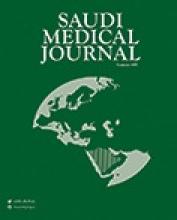Abstract
Objectives: Thousands of people with end-stage organ disease and organ failures die waiting for donations. Although, Saudi Arabia has an active center for organ transplantation, the number of donors is still low. The study focus was the attitudes, beliefs, and knowledge of university students toward organ donation, because the youth are agents of change in their communities and could help to promote organ donation.
Methods: This study had a cross-sectional design and included randomly selected 195 students (97 males and 98 females) between the ages of 19-25 in Qassim University between January and March 2013. A 23-question self-administrated questionnaire in both Arabic and English was completed. The questionnaire was pre-tested on 10 students for validity and reliability. Statistical analysis was performed using the Statistical Package for Social Sciences (SPSS Inc., Chicago, IL, USA) version 13.
Results: The primary source of students’ knowledge on organ donation was television (61.5%). Most students (85.1%) believed that there is low public awareness regarding the subject. However, 37.4% of the students agreed to donate in the future and 68.2% would donate for a relative. One-third of students knew about organ donation cards, but none have signed them. The main reason for refusal was fear of side effects (51.8%). Half of the students (48.7%) think there are misconceptions of the Islamic perspective, as a result there are fewer donors. Medical students showed significantly higher knowledge about organ donation cards and the effectiveness of transplantation as a treatment compared to non-medical students.
Conclusions: College students have little knowledge on the benefits of organ donations. Further, religious misconceptions and accessibility of donor cards are barriers to donations. Public health promotion campaigns could address religious beliefs while a systematic intervention should be put in place to make donor registration more available. A nationwide study with a larger sample size addressing the same objectives needs to be conducted.
- Copyright: © Saudi Medical Journal
This is an open-access article distributed under the terms of the Creative Commons Attribution-Noncommercial-Share Alike 3.0 Unported, which permits unrestricted use, distribution, and reproduction in any medium, provided the original work is properly cited.






